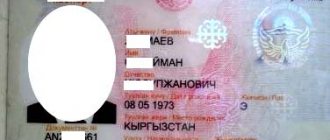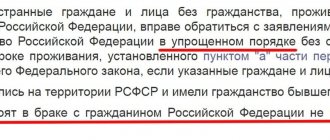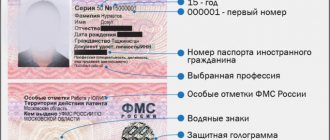Reasons
The grounds for obtaining Russian citizenship, as well as the legal basis for Russian citizenship, are described in the Federal Law “On Citizenship of the Russian Federation,” which was adopted on May 31, 2002.
According to this law, the grounds for obtaining Russian citizenship are:
- Fact of birth.
- Acquisition of citizenship.
- Completing the residency restoration procedure.
- The fact of choosing the country of citizenship.
- Other reasons.
Depending on the basis for obtaining citizenship, the package of required documents also changes. In addition, the procedure for acquiring Russian citizenship also changes depending on the reasons and grounds for acquiring citizenship.
Obtaining Russian citizenship. Ways to obtain Russian citizenship using a simplified scheme
There are two ways to obtain residency in this country:
- Simplified receipt procedure.
- Standard procedure for becoming a citizen.
According to the basic norms, becoming a citizen is the acquisition of residence of the Russian Federation by a representative of another state or a stateless person. Stateless persons, or stateless persons, are people who are not nationals of any country. In other words, they do not have residency in any country in the world.
Acquiring residency by birth
The regulation on the procedure for considering issues of citizenship provides that people born in the Russian Federation have the right of filiation. Filiation is the acquisition of residency in the Russian Federation by right of birth, if the parents of a newborn baby (or one of them) are representatives of the Russian Federation.
In other words, if a child was born from parents who are representatives of Russia, then he automatically becomes a resident of the Russian Federation. Moreover, the country where he was born does not matter at all. In this situation, the so-called principle of consanguinity is applied, when the newborn is assigned the citizenship of his parents.
The basis for acquiring citizenship is also birth in Russia. In this situation, the so-called principle of soil, or earth, is applied. This means that if a child was born on the territory of the Russian Federation, then he has every right to become a resident of this federation.
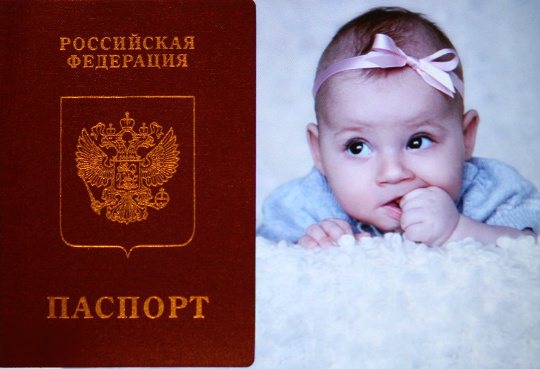
But in this case there are some nuances:
- A child can only apply for residency if his parents are stateless. In this case, the parents of the newborn must give their consent to the newborn becoming a citizen of the Russian Federation.
- A child can acquire citizenship with the permission of parents who are residents of other countries. But in this case, their consent alone will not be enough. The country of citizenship of the child's parents must allow him to take citizenship. If the home country of the parents refuses to grant citizenship to the newborn, then only the consent of his parents will be sufficient.
Residency is assigned automatically by birth. This means that you will not need to apply for citizenship.
If one of the parents has died or is considered missing, then the born baby is automatically assigned Russian residency, provided that the missing parent was a resident of the Russian Federation.
If the baby was born outside the Russian Federation, but the parents want him to become a citizen of Russia, then they need to contact the Russian diplomatic mission in a foreign country with a request to assign citizenship to the born child.
Restoration of citizenship
The regulation on the procedure for considering issues of citizenship also provides for the assignment of citizenship by restoring previously lost citizenship due to its acquisition in another country. In legislative terminology, restoration of residence is called renaturalization. In the basics of Russian citizenship, this term is listed as re-entry into citizenship.
If you have such a right, a simplified scheme is provided for acquiring citizenship of the Russian Federation. This means that instead of the required five years, a representative of a foreign state who was previously a citizen of the Russian Federation will have to live on the territory of the Russian Federation for at least three years. That is, the required period for obtaining residency is automatically reduced by two years.
A clear example of the restoration of citizenship is a person’s residence in Russia at the time when it was part of the USSR. But at the same time, the person had to have USSR citizenship. With the collapse of the Union, citizens could choose their country of citizenship from the former republics of the USSR. If, for example, a person chose Ukraine, but after 10 years he wanted to become a Russian citizen again, then he will undergo a simplified procedure for restoring residence.
Let us recall that the choice of citizenship in the countries that were part of the USSR is called an option. Today the option is not very common. It is possible only if the state is divided into several countries or becomes part of another, as was the case with the Crimean peninsula, which in 2014 passed from Ukraine to Russia.
Receipt
Reasons
Acquisition of Russian citizenship can occur:
- by birth;
- based on the results of the reception;
- based on the results of restoration;
- in other cases provided for by Federal Law No. 62.
We invite you to watch a video about the grounds for acquiring Russian citizenship:
Order
Obtaining citizenship can be through a general procedure or a simplified procedure.
In general, it can be obtained provided:
- Live in the territory of the state for at least 5 years, but you can leave Russia for no more than 3 months once a year. In addition, the person must obtain a residence permit. The period can be reduced by a year if the state is interested in the citizen professionally, or he is a refugee, seeking political asylum, or he has achievements in the field of culture or technology.
- The citizen undertakes not to violate Russian legislation.
- The person has a permanent official income.
- It is necessary to renounce other citizenship, except in cases provided by law (read more about dual citizenship here).
- Proficiency in Russian is required.
These signs do not apply to those citizens who have special services to Russia. Also, if a person served on the territory of the Russian Federation for at least three years, and is himself a citizen of a republic of the former USSR, then the presence of the first criterion is not necessary for him. also provided.
You can resort to it if a number of conditions are met:
- The person has parents who live in the Russian Federation and have Russian citizenship.
- During the collapse of the USSR, a person lived in a republic country, but renounced its citizenship.
- The person lives in Russia and:
- was born in the RSFSR and has USSR citizenship;
- has been married for 3 years to a person who has Russian citizenship;
- recognized as disabled, but has capable children over 18 years of age in Russia;
- there is a child (under 18 years old) with Russian citizenship, while the second spouse has been deprived of parental rights, limited in them or has died;
- after 07/01/2002 he studied in Russia and then stayed to work for 3 years;
- has owned a business with revenues of more than 10 million rubles for more than three years and is an individual entrepreneur;
- works in Russia, and this profession is included in the list of specialties for which citizenship can be obtained in a simplified form;
- a native speaker of Russian, has an official income and complies with the law, living legally in the state.
- A person arrived from a republic of the former USSR and whose official place of residence was the Russian Federation as of July 1, 2002, has the right not to be granted a residence permit.
Reasons for refusal
The decision to obtain citizenship is not always in favor of the applicant.
Here is a list of circumstances that exclude admission to citizenship of the Russian Federation:
- the person threatens the security of the country or wants to eliminate the existing constitutional order;
- participation in military conflicts against Russia;
- conducting active activities aimed at destroying the country;
- deportation;
- presentation of false documents or false information;
- the person is a military serviceman in another state;
- presence of an outstanding criminal record (even outside the country);
- being wanted;
- being in prison.
Acquiring citizenship
The regulation on the procedure for considering issues of citizenship provides for the acquisition of citizenship by acquiring residency. This is a standard procedure that is known throughout the world. The grounds and procedure for acquiring citizenship depend on the length of stay, financial situation and biography of the person wishing to become a resident of the Russian Federation. Thus, according to the current legislation, a citizen of another country has the right to claim citizenship of the Russian Federation only after he has lived within the Russian Federation for more than five years from the date of issue of a residence permit.
How to obtain Russian citizenship, temporary residence permit, residence permit
But there are a number of cases where the standard citizenship scheme is reduced from five years to one year. People who have asked for political asylum in the Russian Federation can obtain residency in one year. In other words, these are people who are in refugee status. This privilege can also be used by persons who have distinguished themselves by very serious successes in science or culture of the Russian Federation.
Acquiring citizenship in this way is called naturalization.
Obtaining citizenship through a simplified procedure is possible if a citizen of another country is married to a resident of the Russian Federation. If their marriage is legally formalized and has existed for at least three years, then a resident of a foreign state has the right to submit a petition to acquire citizenship. In this case, the established mandatory period of residence is reduced by two years.
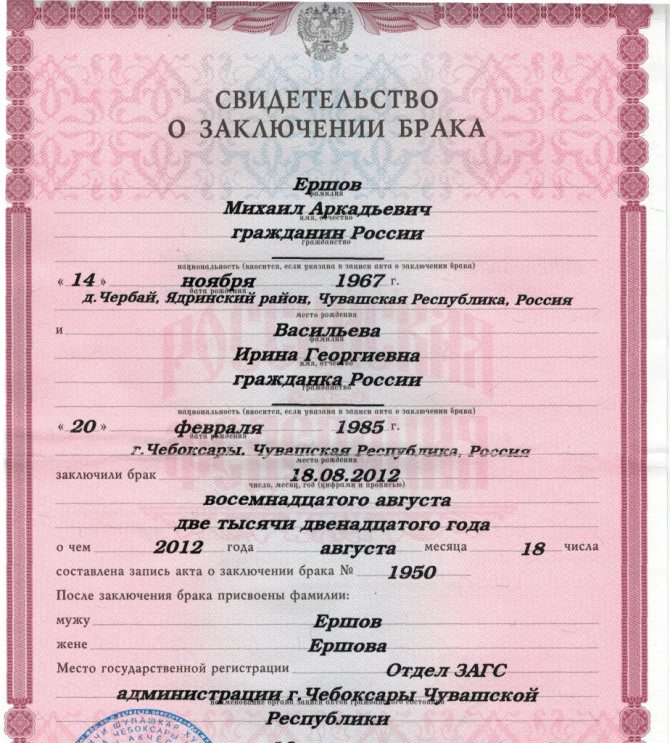
Sample marriage certificate
Main characteristics of naturalization:
- Only a person who is 18 years of age at the time of filing the application can apply for resident status.
- An applicant for citizenship must have a stable financial income and permanent residence.
- An applicant for citizenship must first pass a test of knowledge of the Russian language. This is necessary so that the government of the Russian Federation is confident that the person sufficiently speaks the state language of the Russian Federation. The certificate of passing the test confirms that the applicant will not have a language barrier with Russian representatives in the future.
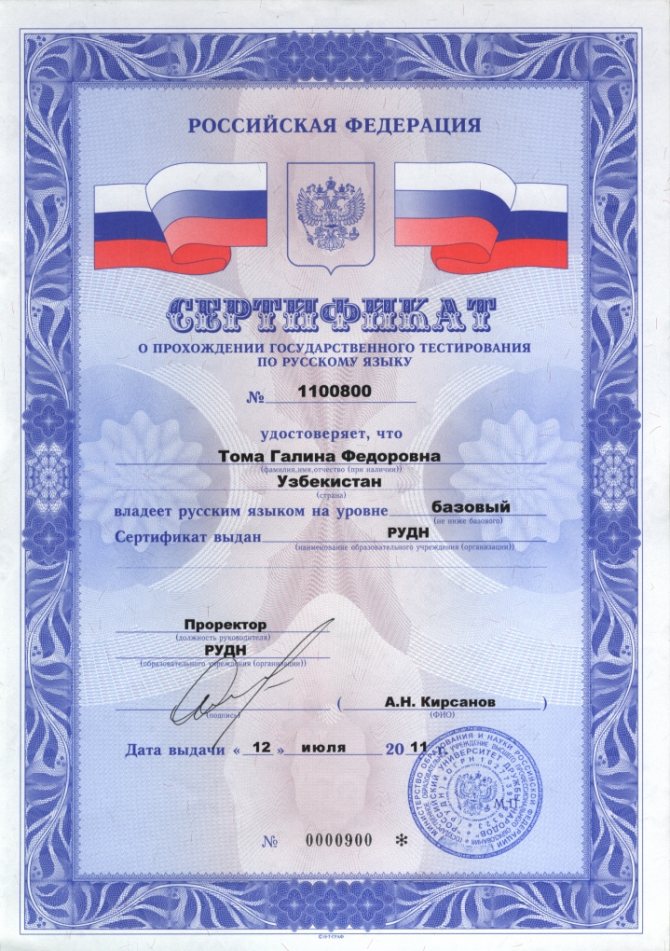
Certificate of passing Russian language testing
Only the President of the Russian Federation has the right to make a decision on conferring citizenship. All applications for residency are reviewed by a commission created under the president.
Procedure and deadlines for obtaining Russian citizenship
Acquiring citizenship by birth
After preparing all the documentation, you must contact the Main Directorate of the Ministry of Internal Affairs of the Russian Federation at your place of residence. Foreigners can also submit an application at Russian missions located in their countries of residence.
Important! Under the simplified procedure, the period for granting citizenship is 6 months from the date of acceptance of the documents. In general, the period is up to a year from the date of acceptance of the documents.
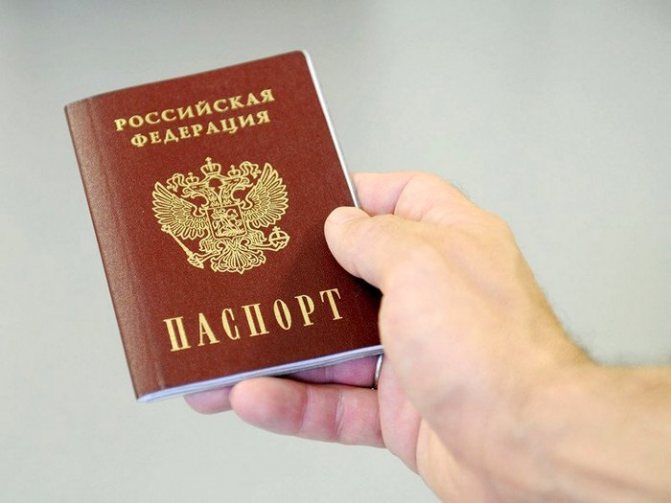
Russian passport
The grounds for rejecting an application are stated in Article 16 of Federal Law No. 62 of May 31, 2002; as a rule, criminals, people who oppose the current constitutional system of the Russian Federation, who have been held accountable for activities related to terrorism and extremism, are refused.
Russia welcomes the registration of citizenship and in every possible way facilitates its speedy acquisition. Continuous residence periods are established to verify the actual purposes pursued by foreign nationals in connection with the application. Living and working in the country is allowed, but engaging in a useless and riotous lifestyle, joining the ranks of drunkards and homeless people, is prohibited.
*Prices are current as of July 2021.
